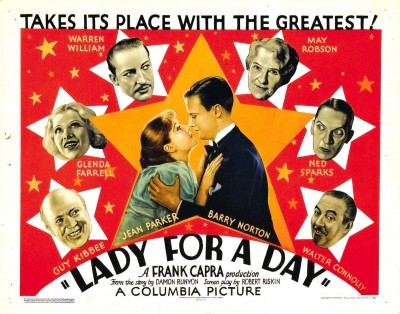
Frank Capra is at once one of the biggest names in American cinema and one of the most difficult to define. Capra’s major body of work falls into three distinct periods: early sound (up through 1933), his most popular era (1934-1944) and a period of decline (1946-1961). And there’s a certain amount of crossover. He’s generally thought of as a populist filmmaker — a champion of the common man etc. — but that seems to have been a persona created for Capra by screenwriter Robert Riskin. All the slightly left-leaning “just-folks” content came from Riskin, though Capra was happy to take credit for it because it was what made him popular. (That it didn’t reflect Capra very much hardly mattered.) One of the films that really started to bring this image into focus was this charming comedy from the end of his earlier period.

I find Lady for a Day (1933) far preferable to most of his later, more self-serious films. Early Capra is largely devoid of message, but here the seeds of the Riskin-inspired vision — also evident in the previous year’s American Madness — have certainly taken hold. Moreover, Capra’s films from this era were much more cinematically adventurous than his “mature” work. There’s a visual elegance to these earlier films that seems to have largely evaporated in Capra’s really big hit It Happened One Night (1934). Whatever that film’s merits (significantly overrated, but undeniably there), it’s hard to deny that it has a kind of workaday, even shabby look. In Lady for a Day, by contrast, we have a film where even scenes of abject poverty shimmer with an almost luminous quality. Capra’s camera is fluid and precise in its moves. He had already learned to cut out a lot of the unnecessary frippery and make his films really move but, here, he was still aiming for — and achieving — a sophisticated look.

The screenplay, from a story, “Madame La Gimp” by Damon Runyon, is a beguiling mix of hard-boiled comedy and never-too-gooey sentiment. The premise finds that gambler Dave the Dude (Warren William) feels compelled to come to the rescue of “Apple Annie” (May Robson), a bedraggled, gin-soaked apple vendor, whose apples are his good luck charm. Annie, it turns out, has a daughter (Jean Parker), who has been raised in Europe and believes her mother to be society matron Mrs. E. Worthington Manville. It’s a pose that worked by mail — thanks to a porter at a swank hotel intercepting the letters and passing them to Annie — but which is about to fall apart with her daughter — and her titled fiancé (Barry Norton) and his snobbish father (Walter Connolly) — on the way to New York. The solution, of course, is to regroom Annie, install her in a suitable domicile and provide her with an appropriate-looking husband (Guy Kibbee as an educated pool shark). It all sounds simpler than it turns out to be in this charming little comedy.

Capra apparently liked the film well enough that he remade it as Pocketful of Miracles in 1961, which would turn out to be his last film. It was in color and widescreen and ran 40 minutes longer than the original. The leads — Glenn Ford and Hope Lange — may have been pallid next to Warren William and Glenda Farrell, but it had a solid Apple Annie in Bette Davis, and Ann-Margret was an improvement over Jean Parker in the original. The supporting cast was strong, but the period (the film is set in 1931) is poorly evoked, the extra 40 minutes were mostly 40 minutes of padding, and the magic of the original was almost — but not quite — missing.
The Asheville Film Society will screen Lady for a Day Tuesday, March 26 at 8 p.m. in the Cinema Lounge of The Carolina Asheville and will be hosted by Xpress movie critics Ken Hanke and Justin Souther.




Before you comment
The comments section is here to provide a platform for civil dialogue on the issues we face together as a local community. Xpress is committed to offering this platform for all voices, but when the tone of the discussion gets nasty or strays off topic, we believe many people choose not to participate. Xpress editors are determined to moderate comments to ensure a constructive interchange is maintained. All comments judged not to be in keeping with the spirit of civil discourse will be removed and repeat violators will be banned. See here for our terms of service. Thank you for being part of this effort to promote respectful discussion.